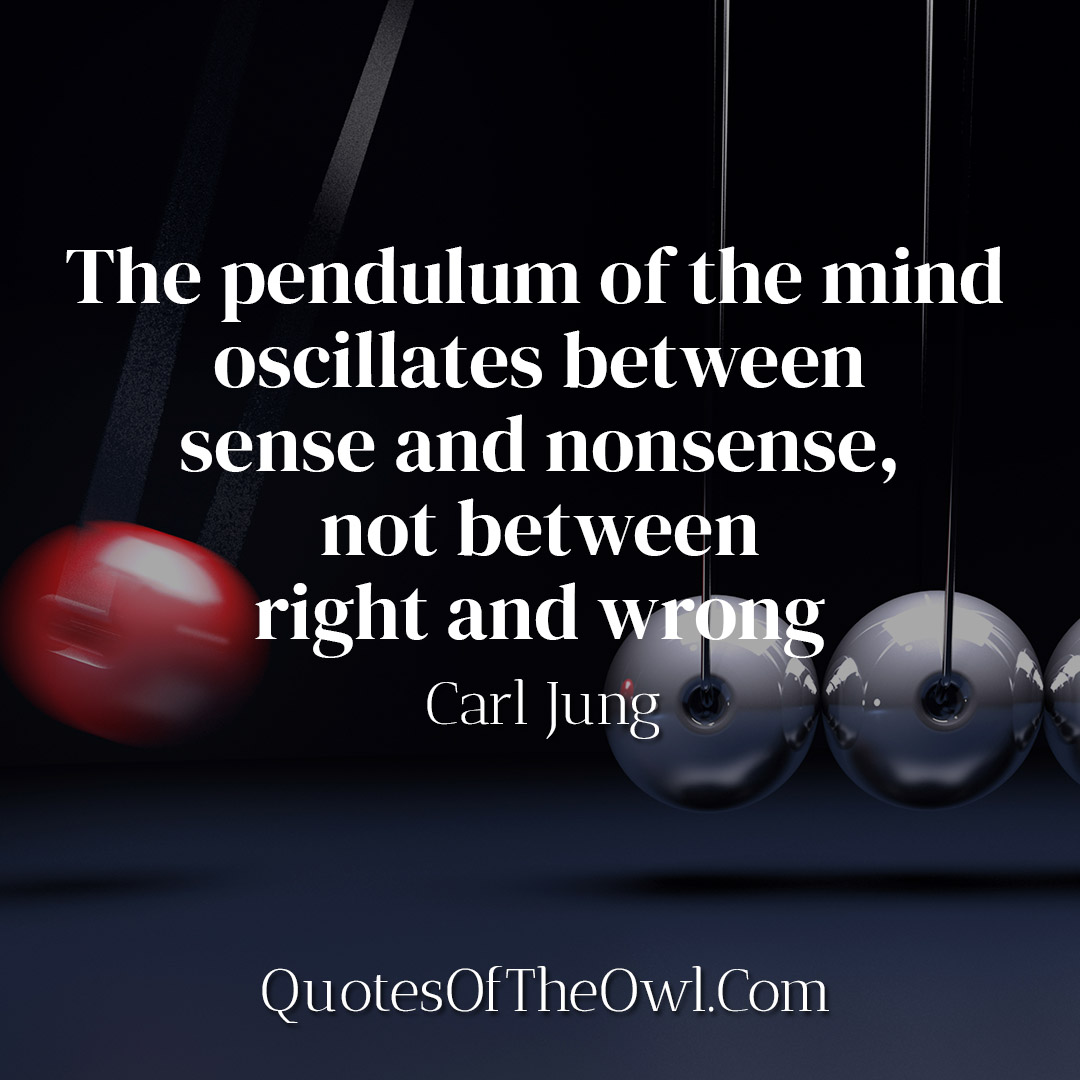The pendulum of the mind oscillates between sense and nonsense, not between right and wrong – Carl Jung’s Quote Meaning
The human mind is a complex entity, capable of oscillating between different states and perspectives. Carl Jung, the renowned Swiss psychiatrist and psychoanalyst, once stated, “The pendulum of the mind oscillates between sense and nonsense, not between right and wrong.” This profound quote reflects the inherent nature of the human psyche, emphasizing the dynamic interplay between rationality and irrationality, rather than the conventional notion of absolute truths and falsehoods. In this article, we delve into the deeper meaning of Carl Jung’s quote and explore its implications in our lives.
Introduction
The mind is a vast landscape, constantly shifting and traversing between different realms of understanding. Carl Jung’s quote invites us to reconsider our perception of truth and reality. Rather than perceiving the mind as a dichotomy between right and wrong, Jung suggests that it fluctuates between sense and nonsense. To comprehend this concept fully, let us dissect the different components of the quote.
Understanding Carl Jung’s Quote
The Pendulum of the Mind
The mind, like a pendulum, swings between two opposite states: sense and nonsense. This metaphorical representation signifies the continuous movement and exploration of ideas and thoughts within our consciousness. The pendulum symbolizes the duality of the mind, constantly shifting from logical and rational thinking to intuitive and irrational thoughts.
Sense and Nonsense
Sense represents our logical and rational faculties, rooted in reason and evidence. It encompasses our ability to make sense of the world, formulating coherent thoughts, and interpreting information based on established frameworks. On the other hand, nonsense refers to the realm of imagination, creativity, and unconventional thinking. It represents the non-linear and abstract aspects of our mind, often associated with intuition and inspiration.
Interpretation of the Quote
Embracing the Duality of the Mind
Carl Jung’s quote encourages us to embrace the inherent duality of the mind. Instead of perceiving sense and nonsense as opposing forces, we should acknowledge their coexistence within us. Both aspects are integral to our understanding of the world and contribute to our personal growth and development. By accepting this duality, we open ourselves up to new possibilities and perspectives.
Perception and Subjectivity
Jung’s quote also highlights the subjective nature of perception. Sense and nonsense are not absolute categories but rather subjective judgments influenced by individual experiences, cultural backgrounds, and personal biases. Understanding this subjectivity allows us to approach differing perspectives with empathy and open-mindedness, fostering greater understanding and cooperation.
The Importance of Balance
Navigating the Spectrum
Maintaining a balance between sense and nonsense is crucial for holistic growth. An excessive focus on sense alone may lead to rigidity and a narrow worldview, inhibiting creativity and stifling innovation. Conversely, an overindulgence in nonsense may result in disconnected thinking and an inability to discern reality from fantasy. Striking a harmonious equilibrium between these two states enables us to navigate the spectrum of ideas and perspectives with clarity and discernment.
Finding Personal Truth
Rather than seeking absolute truths, Jung’s quote invites us to find our own personal truth. This truth lies at the intersection of sense and nonsense, shaped by our individual experiences, values, and beliefs. By embracing both aspects of the mind, we can cultivate a deeper understanding of ourselves and the world around us, leading to personal growth and self-actualization.
Applying the Quote in Daily Life
Accepting Ambiguity and Uncertainty
The quote reminds us to embrace ambiguity and uncertainty as essential elements of the human experience. Instead of seeking definitive answers, we can approach life’s questions with curiosity and a willingness to explore diverse perspectives. This mindset allows us to adapt to change, navigate complexities, and foster intellectual flexibility.
Cultivating Critical Thinking
Understanding the pendulum-like nature of the mind encourages the development of critical thinking skills. By questioning our assumptions, analyzing information objectively, and challenging established norms, we can expand our intellectual horizons. Critical thinking enables us to separate fact from fiction, empowering us to make informed decisions and navigate the complexities of the modern world.
Conclusion
Carl Jung’s quote encapsulates the ever-changing nature of the human mind, which oscillates between sense and nonsense. By acknowledging and embracing this dynamic interplay, we can cultivate a balanced perspective and a deeper understanding of ourselves and the world. Striving for equilibrium between reason and intuition allows us to explore new ideas, challenge established beliefs, and foster personal growth. So, let us embrace the pendulum of our mind, as it swings between the realms of sense and nonsense, propelling us towards greater self-awareness and wisdom.
Recommended Books by Carl Jung

